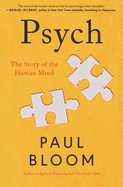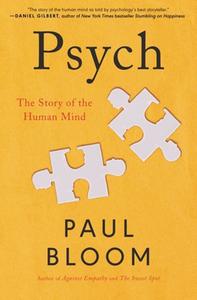
 In his books Against Empathy and The Sweet Spot, University of Toronto research psychologist Paul Bloom has explored discrete, if provocative, topics: rational compassion and suffering. Psych: The Story of the Human Mind features the same enlightening combination of scholarly engagement and popular appeal that marked those books, only this time he's tackling a much larger subject: the entire discipline of psychology.
In his books Against Empathy and The Sweet Spot, University of Toronto research psychologist Paul Bloom has explored discrete, if provocative, topics: rational compassion and suffering. Psych: The Story of the Human Mind features the same enlightening combination of scholarly engagement and popular appeal that marked those books, only this time he's tackling a much larger subject: the entire discipline of psychology.
Psych is based on the Introduction to Psychology course Bloom has taught for many years at Yale University, where he holds the title of emeritus professor. In a book he says can be read from cover to cover (his recommended approach) or for his insights into specific topics, Bloom begins with the anatomy of the brain and the insights of neuroscience, and moves on from there in a comprehensive survey that touches upon subjects that include the problem of consciousness, language, emotions, social behavior and much more. He displays an impressive familiarity with the principles and key research of each field, while writing in an enthusiastic, at times almost playful, style that's designed to engage general readers.
Bloom doesn't hesitate gently to remove some of the icons of his discipline from their pedestals. He considers the enduring appeal of the work of men like Sigmund Freud, B.F. Skinner and Jean Piaget, and then, respectfully but determinedly, proceeds to expose the flaws in their theories. In the case of Freud, he explains why the founder of psychoanalysis is "dismissed and despised by many," but concludes that there is "a lot of value to Freudian thought," provided we "retain some of the core insights of his theory and jettison the silly stuff." For Bloom, Skinner's ideas "just fail to explain the richness of human psychology," but he credits the champion of behaviorism for giving us "a better understanding of some important learning mechanisms." Bloom has had an interest in developmental psychology since his undergraduate days, and after reviewing Piaget's model of child development, he concludes that "children are far smarter than Piaget claimed."
After a sobering chapter on the challenges of diagnosing and treating mental illness, Bloom finally considers the relatively new subject of positive psychology, something he calls a "messy field" that he says has some great scholars, along with "no shortage of hucksters." And as he concludes this fascinating journey across his sprawling subject, he urges his readers to approach the field to which he's devoted his life with two attitudes: humility and optimism. "The more you look at the mind and how it works from a serious scientific point of view," he writes, "the more you appreciate its complexity, its uniqueness, and its beauty." --Harvey Freedenberg, freelance reviewer
Shelf Talker: Psychology professor Paul Bloom offers an engaging, comprehensive, accessible introduction to the field of psychology.

